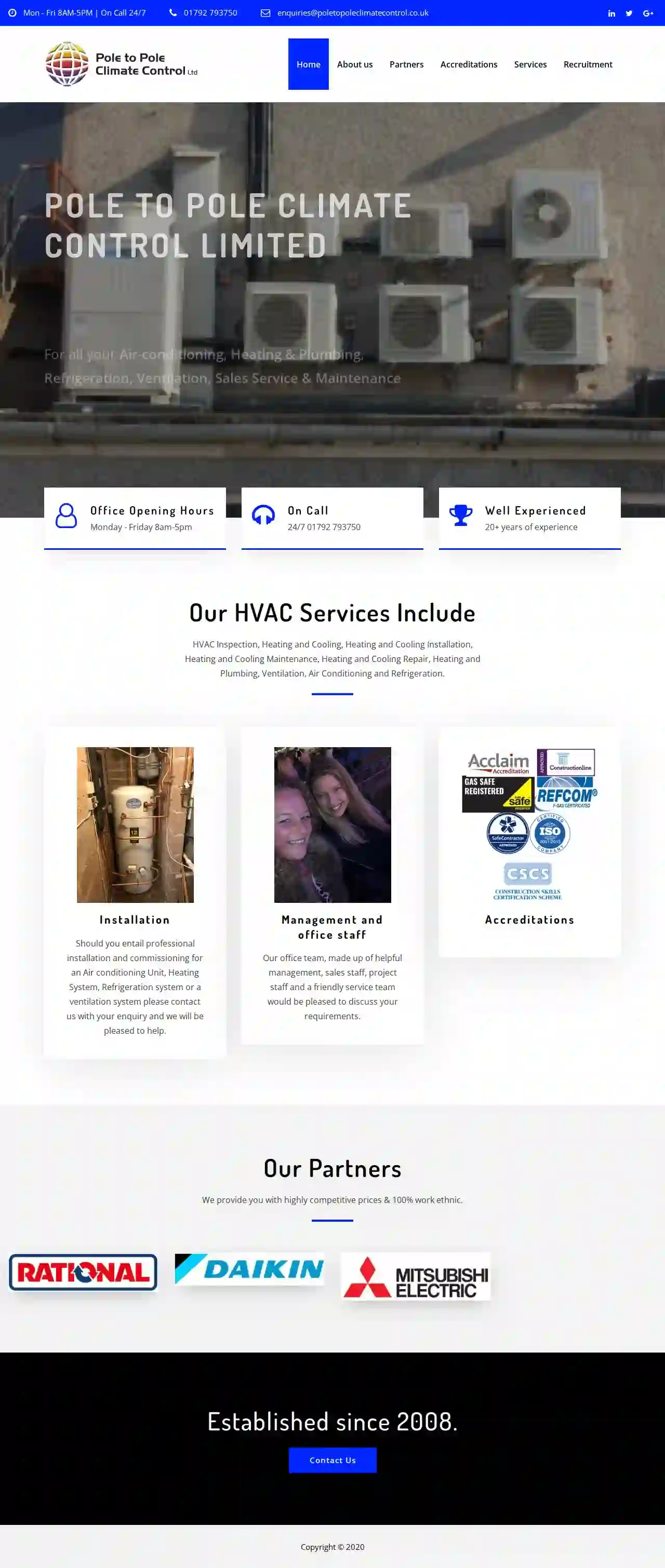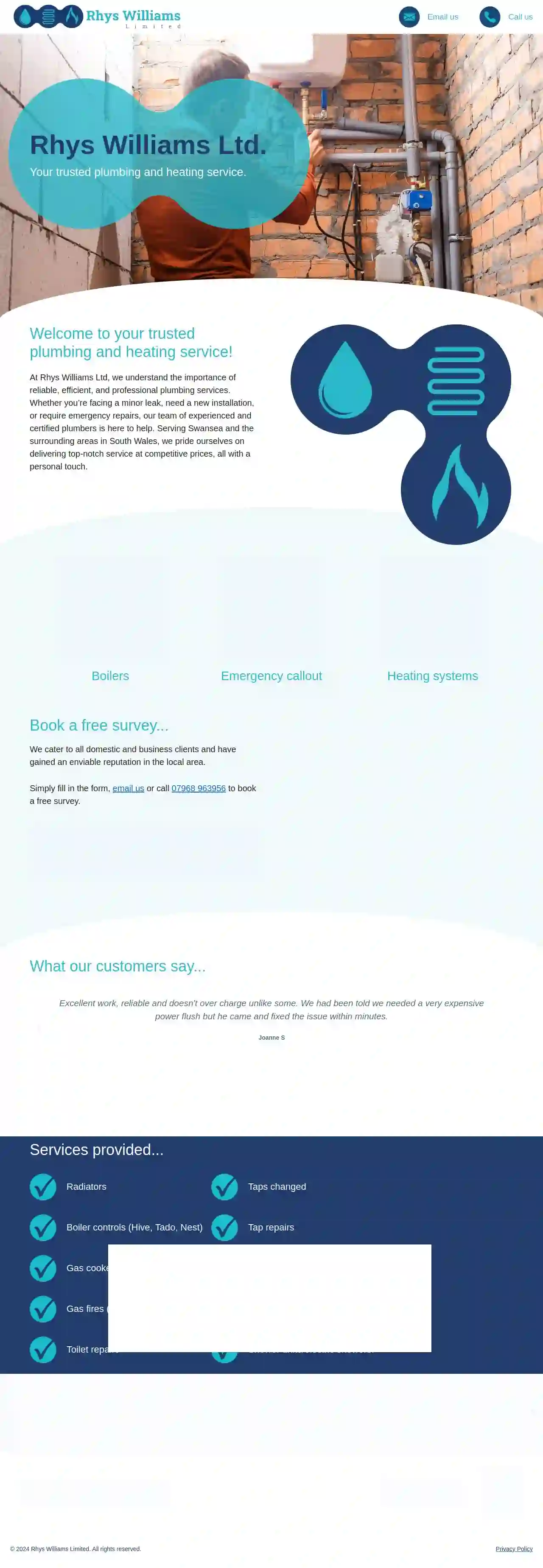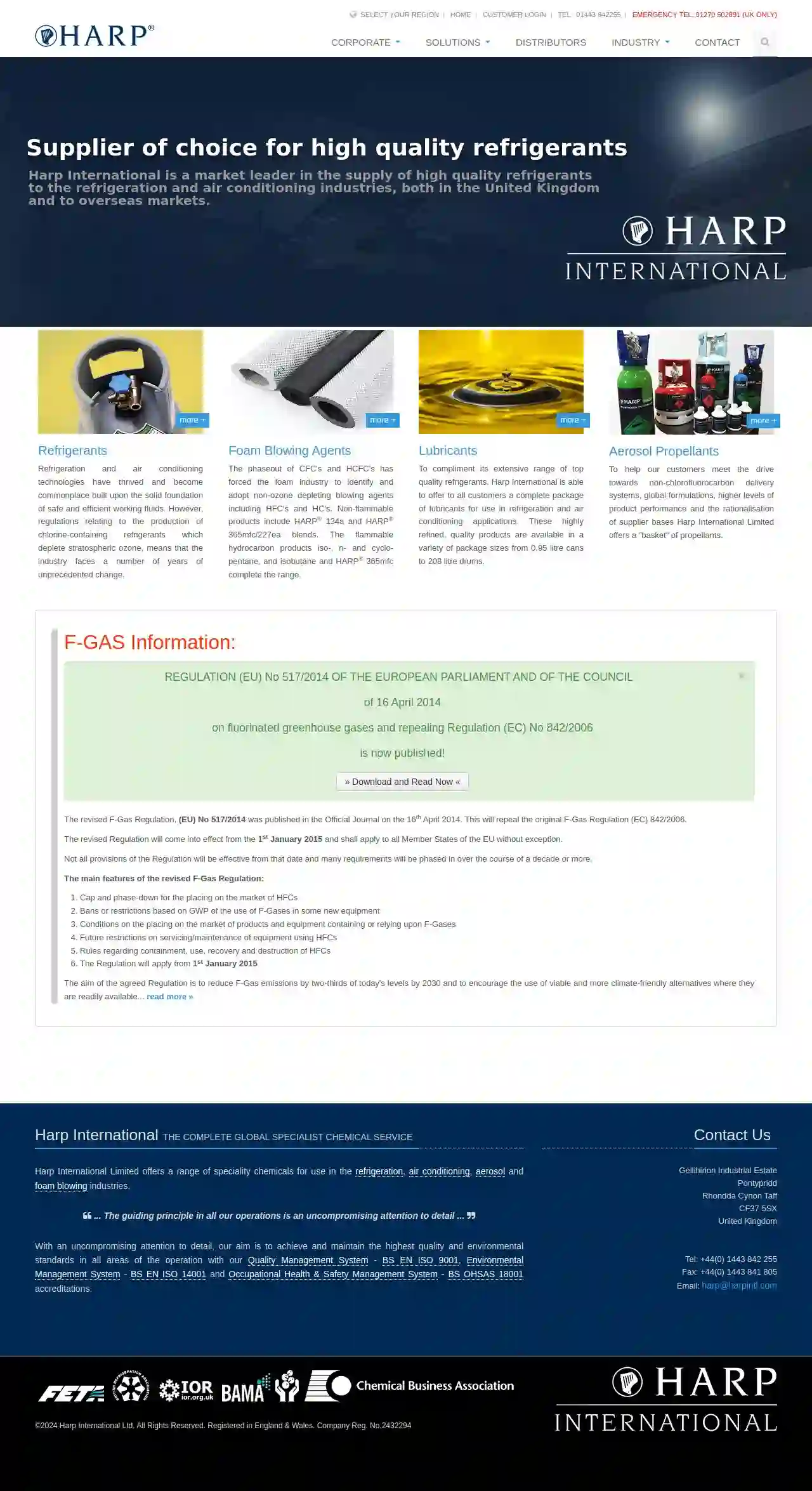Commercial HVAC Pyle
Find the best Commercial HVAC Services in Pyle
Get multiple Industrial HVAC quotes for your project today! Compare profiles, reviews, accreditations, portfolio, etc... and choose the best deal.

Pole to Pole Climate Control
51 reviewsNeath, GBPole to Pole Climate Control Limited is your one-stop shop for all your air-conditioning, heating, plumbing, refrigeration, and ventilation needs. With over 20 years of experience, we offer a comprehensive range of services, including installation, maintenance, and repair. Our team of highly skilled engineers is dedicated to providing you with the highest quality service at competitive prices. We are committed to exceeding your expectations and ensuring your complete satisfaction. Our office team, made up of helpful management, sales staff, project staff, and a friendly service team, would be pleased to discuss your requirements. We are proud to be accredited by leading industry bodies and work with reputable partners such as Rational Service Partners, Daikin Service Partners, and Mitsubishi Electric Service Partners. Contact us today to learn more about our services and how we can help you create a comfortable and efficient environment.
- Services
- Why Us?
- Gallery
Get Quote
Thermal Earth
4.240 reviewsCapel Hendre Industrial Estate, Ammanford, SA18 3SJ, GB- Services
- Why Us?
- Accreditations
- Gallery
Get Quote
Ross Cox Plumbing and Heating Ltd
37 reviews26 Shutgate Meadow, Williton, Taunton, TA4 4TJ, GBIf you require cost effective, reliable heating and plumbing engineers then look no further. We cater to all domestic and business customers central heating systems, gas, oil services and plumbing requirements. Ross Cox Plumbing and Heating Ltd work throughout the West Somerset area. We have the knowledge and expertise needed to ensure that you receive nothing but the best service. Our reputation has been developed through hard work and reliability which is why we are one of the area's number one choices for plumbing, gas & oil related work. To discuss your project, to talk through your options or to obtain a free estimate or quotation please contact us. To ensure our customers receive a high standard of workmanship and professionalism, our company is accredited and monitored by several trade and industry bodies. NEED TO BOOK AN ANNUAL BOILER SERVICE OR REQUIRING A QUOTE FOR WORK? Our experienced and helpful staff will always be happy to assist you.
- Services
- Why Us?
- Accreditations
- Our Team
- Testimonials
- Gallery
Get Quote
A B Engineering Oil Heating Service
Lauderdale Drive, Barnstaple, EX32 8LF, GBAB Engineering SW Ltd is a leading provider of oil boiler services, including installation, servicing, and maintenance. With a team of experienced professionals, we offer a range of services to ensure your oil boiler is running efficiently and safely. Our services include oil boiler installation, oil boiler servicing, AGA & Rayburn servicing, oil tank installation, oil tank servicing, gas boilers, power flushing, and solar thermal water heating. We serve a wide range of areas, including Barnstaple, Bideford, Bodmin, Braunton, Chulmleigh, Combe Martin, Ilfracombe, Launceston, Liskeard, Looe, Lynmouth, Lynton, Mortehoe, North Molton, Plymouth, South Molton, and Tiverton. Contact us today to learn more about our services and how we can help you with your oil boiler needs.
- Services
- Why Us?
- Gallery
Get Quote
Rhys Williams Ltd
3.73 reviewsSwansea, SA1, GBWelcome to your trusted plumbing and heating service! At Rhys Williams Ltd, we understand the importance of reliable, efficient, and professional plumbing services. Whether you’re facing a minor leak, need a new installation, or require emergency repairs, our team of experienced and certified plumbers is here to help. Serving Swansea and the surrounding areas in South Wales, we pride ourselves on delivering top-notch service at competitive prices, all with a personal touch. We cater to all domestic and business clients and have gained an enviable reputation in the local area. Simply fill in the form, email us or call 07968 963956 to book a free survey.
- Services
- Why Us?
- Accreditations
- Our Team
- Testimonials
- Gallery
Get Quote
Blake Home Services
57 reviewsBridgwater, GBSince 2002 Jason Blake has been transforming homes, kitchens, bathrooms and heating systems in the South West of England. Using the latest technologies to improve convenience, reduce running costs and make homes cosy and pleasant places to live in. My experience ranges from installing small 1.8 kW flue-less Gas fires, on to 200kW log fired boilers for heating hotels. I have also designed and installed numerous central heating systems, bathrooms, en-suites, wet rooms, kitchens and underfloor heating systems. I have worked in old stone Mansion houses, industrial factories, farm houses to modern apartment blocks and modern construction homes, including Passive Houses and timber lodges. I have installed a wide variety of heating technologies, Gas and oil conventional boilers, air source and ground source heat pumps, biomass boilers using solid fuels such as logs, wood pellet and wood chip and even humble Wood Burning Stoves. I also installed solar PV, solar thermal tube and flat panel systems for hot water. Gas Safe Registration Number 655760 Viessman Gas Boiler Accredited Installer
- Services
- Why Us?
- Accreditations
- Our Team
- Gallery
Get Quote
PHC Parts
521 reviewsUnit 3, Parkway Trading Estate, Bristol, BS2 9PG, GBPowred Heating Components is a leading supplier of heating spares and components. We offer a wide range of products from top brands, including Baxi, Glow-worm, Ideal, Vaillant, and Worcester Bosch. Our extensive inventory includes boiler spares, radiator valves, pumps, and pressurisation units, as well as underfloor heating and solid fuel stove parts. We also provide a variety of plumbing and electrical products, including copper tube and fittings, brassware, and electrical heating appliances. With a strong focus on customer service, we aim to provide fast and reliable delivery, competitive pricing, and expert advice to help you find the right products for your needs.
- Services
- Why Us?
- Accreditations
- Gallery
Get Quote
Heatlink Mechanical Engineering
Unit 1a Whitebeam Court Rhodfa, Ty Du Road, Nelson, CF46 6PQ, GBHeatlink (Mechanical) Limited are a South Wales based mechanical and electrical contractor operating within a large range of sectors including commercial, residential, industrial, education and healthcare. From our offices in Cardiff South Wales, we carry out work within the South and West country. We offer a full range of services from specification build, design development and full design and installation to full post contract maintenance services. We undertake work on a design and build, specification or bill of quantities basis. We carry out works for a large number of consultants, contractors and private clients and pride ourselves on the repeat business we achieve.
- Services
- Why Us?
- Gallery
Get Quote
Harp International Ltd
3.917 reviewsPontypridd, Rhondda Cynon Taff, Gellihirion Industrial Estate, CF37 5SX, GBHarp International is a market leader in the supply of high quality refrigerants to the refrigeration and air conditioning industries, both in the United Kingdom and to overseas markets. With an uncompromising attention to detail, our aim is to achieve and maintain the highest quality and environmental standards in all areas of the operation with our Quality Management System - BS EN ISO 9001, Environmental Management System - BS EN ISO 14001 and Occupational Health & Safety Management System - BS OHSAS 18001 accreditations.
- Services
- Why Us?
- Accreditations
- Gallery
Get Quote
24/7 Heating & Plumbing Renewables Ltd
4.912 reviews6 Ynysddu, Pontyclun, CF72 9UA, GBFounded by Craig Spiller in 2011, 24/7 Heating & Plumbing offers a trusted local plumbing and gas-safe services in the South Wales area and beyond. The team at 24/7 Heating & Plumbing is known for their high-quality of work and friendly customer service. Based out of Llanharan, Pontyclun, in South Wales, 24/7 Heating & Plumbing can provide you with a competitively priced service for any job, however big or small. With skills and experience in a variety of areas, including boilers, underfloor heating water systems, and log burning stoves, the team can offer you an all-inclusive solution to your heating and plumbing needs. Our Mission is to provide first class heating and plumbing services to the domestic and commercial customer.
- Services
- Why Us?
- Accreditations
- Our Team
- Testimonials
- Gallery
Get Quote
Over 12,692+ HVAC Companies onboarded
Our HVAC pros operate in Pyle and surrounding areas!
HVACCompaniesHub has curated and vetted the Best HVAC Businesses in and around Pyle. Find a top & trustworthy contractor today.
Frequently Asked Questions about Commercial HVAC
- Size and Capacity: Commercial HVAC systems are usually much larger than residential systems to handle greater heating and cooling demands of bigger spaces.
- Complexity: Commercial HVAC systems are more complex, often using multiple units, zones, and advanced controls.
- Ductwork: Commercial ductwork is typically more extensive and complex than residential ductwork.
- Refrigerant: Commercial systems may use different types of refrigerant than those used in residential systems.
- Maintenance Requirements: Regular maintenance is essential for both types of systems, but commercial systems typically require more frequent and specialized maintenance.
- Cost: Commercial HVAC installation and maintenance costs are generally higher than residential due to system complexity and specialized labor required.
- Experience: Choose a contractor with extensive experience in commercial HVAC projects. Check how long they've been in business and their portfolio of past projects.
- Licensing and Insurance: Verify licenses, insurance (liability and workers' compensation), and bonding.
- Certifications: Look for certifications such as NATE (North American Technician Excellence) which indicate a high level of technical competency.
- Reputation: Check for online reviews and ratings on sites like Google, Yelp, and the Better Business Bureau.
- References: Don't hesitate to check their references.
What is retro-commissioning (RCx)?
How is commercial HVAC different from residential HVAC?
What is a Building Automation System (BAS)?
How do I find a reputable commercial HVAC contractor?
What is retro-commissioning (RCx)?
How is commercial HVAC different from residential HVAC?
- Size and Capacity: Commercial HVAC systems are usually much larger than residential systems to handle greater heating and cooling demands of bigger spaces.
- Complexity: Commercial HVAC systems are more complex, often using multiple units, zones, and advanced controls.
- Ductwork: Commercial ductwork is typically more extensive and complex than residential ductwork.
- Refrigerant: Commercial systems may use different types of refrigerant than those used in residential systems.
- Maintenance Requirements: Regular maintenance is essential for both types of systems, but commercial systems typically require more frequent and specialized maintenance.
- Cost: Commercial HVAC installation and maintenance costs are generally higher than residential due to system complexity and specialized labor required.
What is a Building Automation System (BAS)?
How do I find a reputable commercial HVAC contractor?
- Experience: Choose a contractor with extensive experience in commercial HVAC projects. Look for contractors who specialize in your building type.
- Licensing and Insurance: Verify licenses, insurance (liability and workers' compensation), and bonding.
- Certifications: Look for certifications such as NATE (North American Technician Excellence) which indicate a high level of technical competency.
- Reputation: Check for online reviews and ratings on sites like Google, Yelp, and the Better Business Bureau.
- References: Request references from past clients and follow up to learn about their experiences.